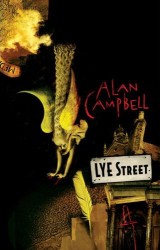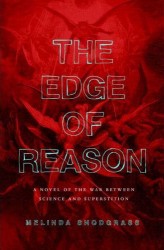The last book I read: Lye Street by Alan Campbell. I read Scar Night earlier this year during my Australian sojurn, and thought it was quite good, especially for a first novel. This is a prequel that focuses primarily on two storylines: one that highlights the madness of the angel Carnival, the other of which deals with the reconstruction of the demon Basilis. They come together in the story of a man marked for death by Carnival, and the deal he tries to make with Basilis for protection.
It’s a short book, and it shows off Campbell’s skills at both imagery and atmosphere, but there’s a definite sense that a lot of what’s going on is deepening the mysteries that the “main” series of books will address. Some of what happens adds more colour and detail to the world, but some of that fails to cohere in the book–you get that feeling that there are whole passages that don’t serve this story, but that are included in it because of the role they will play in the larger narrative.
That being said, it was definitely worth the read, and it probably bumped Iron Angel (already purchased, on the strength of Scar Night) a few places up the queue, despite a couple of poor-ish reviews I’ve seen of it online.
For comparison, here’s the PW review:
Campbell’s nightmarish prequel to Scar Night (2006) explores the depths of twisted revenge. Every half-century since the Deepgate year 511, when Henry Bucklestrappe was extracted mysteriously from the temple dungeons and nastily murdered, the hideously scarred angel, Carnival, has slain a Bucklestrappe descendent. Now, in 1012, it is wily old prospector Sal Greene’s turn to be a victim. He asks phantasmacist Laccus Ravencrag to summon up the demon Basilis, unexpectedly impotent, to battle Carnival, herself victimized by her own psyche and trapped by the brutal witch Ruby. Campbell meshes pity with terror against the bleak phantasmagoric backdrop of a city suspended from chains, swinging dismally over a yawning abyss. In a civilization literally built upon nothing, dark magic and vengeance are the rule of the day, and Campbell will quickly have readers under his creepy and sometimes heartbreaking spell.
The next book I will read: The Edge of Reason by Melinda Snodgrass.
The why of this might not be what you think, though.
You might think that I would want to read a book that the author describes like this (quoting from her appearance at Scalzi’s blog):
From an off-handed remark we began a discussion of why, at the beginning of a new century, were people putting more credence in crystal power, guardian angels, spirit guides, Tarot cards, and psychic readings than in chemistry, physics, astronomy and biology?
We ran through the usual suspects — the Religious Right, Americans’ distrust of intellectuals, globalization and the fear of a big bad world and other cultures we can’t control — and came to no good answer. But I kept pondering the issue and I suddenly thought: What if there were creatures that wanted to keep us ignorant and afraid? That raised two more questions — why would they do it, and how would they do it?
The why I decided upon was that there were creatures in other multiverses who fed on powerful emotions. Since hate, fear, grief, and pain are a lot easier to engender than love and joy they set out to encourage us in our worst tendencies. They became our dark myths and our gods.
The how was also fairly straightforward. We kill with great abandon in defense of of our gods, and our absolute certainty that ours is the only true god. Add to that our tribalism that has led us to distrust and kill the other, and I had the broad concepts of the book.
Now, don’t get me wrong, that sounds great, but that’s not the real reason why this has jumped to the top of the queue
You might think it was PNH‘s concise description, which pushes both my “the religious are actively anti-reason” and “Cthulhu” buttons:
A contemporary metaphysical thriller about the secret battle between the forces of rationality and the Old Ones From Beyond Time, the latter of whom are using superstition and religion as the means by which to knock over the barriers that prevent them from breaking through and eating our brains.
But while that would probably do it, it’s not the real reason in this case either.
You might think that anyone who prominently posts the picture below at their web site would get bumped up the queue, but that’s not the real reason either.

See, all of those are good reasons, but the real reason is “space, constitutional law, and the golden age of science fiction”.
Maybe I should expand on that. You know the old gag that “the golden age of science fiction is twelve“–well in this case it’s actually thirteen or foutreen. In my case that was the late 80s, and I was a kid who loved science fiction, and had a keen interest in both near future exploration of space, and in constitutional law. Yeah, I was a nerdy kid. Both of those interests continue, although I admit I have longer decided that the later is drastically more important than the former.
Anyway, I had seen Melinda’s name on the Wild Cards books, and liked her stuff there, so when I saw a novel with the same name I picked it up. That book was Circuit, and it was the first of a trilogy which all came out in the late 80s. It blew me away–I found and loved the other two books as well. It was all near space, near future, and most importantly constitutional law. It was probably the first time I had read something that tried to deal with how we get from where we are to the futures that so many science fiction novels are set in. I found the books fascinating, and I kept my eyes out for other works… and there weren’t any. (Apparently she went to work scriptwriting, quite a loss to the world of the novel–but on the other hand, she did write what was probably the best episode of Star Trek: The Next Generation, The Measure of A Man. It’s not an accident that this was also a highly legalistic story, with a focus on constitutional issues and civil rights.)
Well, she’s back now, with a book that looks to be right up my alley. From all signs, I’d have been picking up this book even if I had never heard of her, but I never really took any of those signs into consideration–I couldn’t really focus on them with my inner fourteen year old so full of squee.
If you want to see if The Edge of Reason would work for you, you can read over a hundred pages at Melinda’s site.
I haven’t reread the three Circuit books since the 80s, so I don’t know if they still stand up. However that inner fourteen year old says you should all go track down used copies and read them. (Mine are packed away in one of the fourteen or so crates of MMPBs that I still haven’t got around to unpacking).
Through the magic of the Internet, though, I was able to locate pictures and back cover copy of the books, which I’ll add behind the cut, for your entertainment.
Circuit, 1986
THE HIGH FRONTIER OF JUSTICE
Earth wanted new laws for the new frontier. So the Fifteenth Circuit Court was created. Its jurisdiction: space. Its purpose: to regain control of the outlanders, their colonies, their space stations, their asteroids, to lead the back into Earth’s folds.
Then the U.S. President and the Soviet Premier authorized a nuclear attack against a rebellious colony on the Moon.
And Cabot Huntington, appointed to head the Court by the President, is the only man who can stop it. He will have to use his power — to fight the men who gave him the power.
The Fifteenth Circuit Court is now in session…
Circuit Breaker, 1987
THE FIFTEENTH CIRCUIT COURT IS STILL IN SESSION . . .
Cabot Huntington had risked his career when he defied the men who appointed him, to bring true justice to the high frontier of space. And now, he must tackle the thorniest legal problem of the century: Who owns Mars?
Is it the colonists who live there, who have developed a thriving mining economy? Or is it the Earth-based industrial conglomerate the covets that economy? The colonists have the economic power. The conglomerate has the political power. Both sides are determined to win — no matter what the cost.
JUDGE CABOT HUNTINGTON: THE VERDICT — AND THE FATE OF THE FUTURE — IS IN YOUR HANDS.
Final Circuit, 1988
FOR BETTER OR WORSE, THE FINAL VERDICT IN IN.
The Fifteenth Circuit Court has been disbanded, as Cabot Huntington flees through the belt, dodging an order of impeachment.
Then terrorists seize an anti-matter ship, threatening to bombard Earth from space, and Earth’s politicians use the situation as an excuse to move, full-force, against the dissident elements in the system.
The long-anticipated war has finally begun.
And ex-Justice Cab Huntington is out of the courtroom — and into the heart of a savage revolution…




1 comment for “Just Read, To Read”